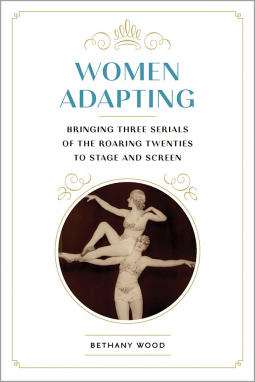
Women Adapting
Bringing Three Serials of the Roaring Twenties to Stage and Screen
by Bethany Wood
This title was previously available on NetGalley and is now archived.
Send NetGalley books directly to your Kindle or Kindle app
1
To read on a Kindle or Kindle app, please add kindle@netgalley.com as an approved email address to receive files in your Amazon account. Click here for step-by-step instructions.
2
Also find your Kindle email address within your Amazon account, and enter it here.
Pub Date May 29 2019 | Archive Date May 31 2019
University of Iowa Press | University Of Iowa Press
Talking about this book? Use #WomenAdapting #NetGalley. More hashtag tips!
Description
Bethany Wood examines three well-known stories that debuted as women’s magazine serials—Gentlemen Prefer Blondes, Edith Wharton’s The Age of Innocence, and Edna Ferber’s Show Boat—and traces how each of these beloved narratives traveled across publishing, theatre, and film through adaptation. She documents the formation of adaptation systems and how they involved women’s voices and labor in modern entertainment in ways that have been previously underappreciated. What emerges is a picture of a unique window of time in the early decades of the twentieth century, when women in entertainment held influential positions in production and management. These days, when filmic adaptations seem endless and perhaps even unoriginal, Women Adapting challenges us to rethink the popular platitude, “The book is always better than the movie.”
Advance Praise
“This book investigates the powerful yet previously overlooked connections between the rarely credited women who wrote, cowrote, influenced, and profited from the adaptation industry and popular culture depictions of femininity and whiteness. For historians of the early twentieth century, especially those interested in the intersections among theatre, film, magazine/serial, and book culture, it’s a crucial addition.”—Jane Barnette, author, Adapturgy: The Dramaturg’s Art and Theatrical Adaptation
“Wood skillfully reveals the interplay of gender and adaptation, illustrating the various societal and industrial forces that have contained, controlled, or curtailed the contributions of women. Nearly a century later, many of the thorny issues regarding constructions of femininity persist. Her work offers a potential methodology for exploring the shifting constraints and opportunities for women artists in other periods of history or in contemporary culture.”—Christine Woodworth, coeditor, Working in the Wings: New Perspectives on Theatre History and Labor
Available Editions
| EDITION | Other Format |
| ISBN | 9781609386498 |
| PRICE | $90.00 (USD) |
| PAGES | 304 |
Links
Average rating from 1 member
Featured Reviews
 Reviewer 153322
Reviewer 153322
Gentlemen Prefer Blondes, Show Boat and The Age of Innocence began their media lives in the 1920s as magazine serials, some of the first to enjoy more comprehensive copyright protection and generate consistent income for their creators as stage plays, radio versions and movies shaped the plots to the contours and contexts of new audiences. Wood examines the evolution of Anita Loos', Edna Ferber's and Edith Wharton's creations, and the ways in which their adaptations underscore and sometimes deviate sharply from their authors' intentions.



